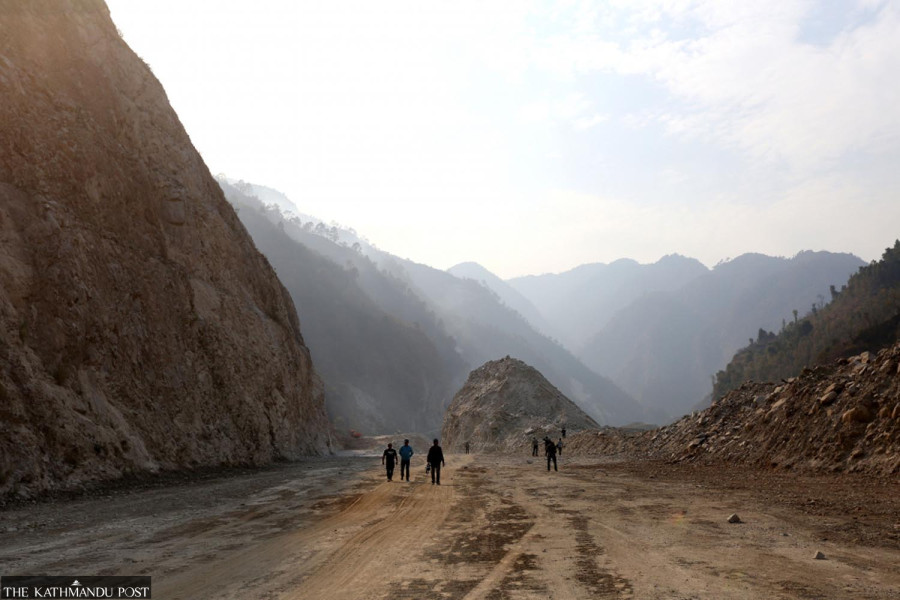National
Army gets fourth deadline extension for Kathmandu-Tarai expressway project
Improved connectivity with India and China makes the project strategic, insiders say.
Post Report
The government has decided to give three more years to the Nepal Army to complete the Rs175 billion Kathmandu-Tarai expressway, the fourth extension in six years after the project failed to meet the completion deadline.
The Cabinet meeting on Tuesday took the decision to this effect.
The new deadline is April 2027.
On May 4, 2017, the government formally handed over the much-touted project to the army, putting an end to all political controversy. It had been given four years to complete the project.
Nepal Army in August 2017 started the construction of the 72.7 kilometre expressway that will link Kathmandu with the central Tarai.
As the project was nowhere near completion by August 2021, its deadline was extended to July 2024.
The delay in the preparation and endorsement of the detailed project report and the Covid pandemic prompted the army to further postpone the deadline to December 2024.
The latest decision to extend the deadline comes following the inspection of the project by Prime Minister Pushpa Kamal Dahal.
On Tuesday, a high-level team including prime minister Dahal inspected the under-construction expressway, which is one of the national pride projects.
Brigadier General Krishna Prasad Bhandari, the army spokesperson, told the Post that the project has so far achieved 22.47 percent physical progress as of mid-April.
He said that the financial progress, so far, is 23.47 percent.
The army has spent Rs36 billion in the past six and a half years since it started working on the project. In the current fiscal year, ending mid-July, the project has targeted to spend Rs30 billion.
Tuesday’s Cabinet has also allowed the project to acquire additional land.
The Khokana area is the entry point of the project.
However, the government hasn’t been able to acquire 411 ropani [1 ropani is 508.73 sq metres] of land for the expressway and an additional 300 ropani for the construction of parking spaces and a port.
A committee under the National Planning Commission in 2021 tried to convince the local residents of Khokana to sell their land but failed. Several efforts by parliamentary committees, too, have not yielded positive results.
The locals have been refusing to hand over their land saying five different projects are underway in the Khokana area and this might ultimately displace them from their land, according to army officials.
In addition to the expressway, an electricity transmission line, an outer ring road and the Bagmati Corridor pass through the area. Similarly, the government is also developing Khokana as a smart city.
“We have requested the government, continuously, to settle the land acquisition issues,” said Bhandari.
“The problem is on package 11, which stretches 6.5 kilometres from the entry point of Khokana,” he said.
Tenders are pending for packages 8, 9,10 and 11, which are around 26 kilometres from the entry point.
“We have planned to award the contract of these remaining packages by the end of this fiscal year,” said Bhandari, adding that work was slow due to the Covid pandemic.
“The government had given deadline extensions to several projects affected by Covid pandemic, except the expressway.”
As per the detailed project report, the highway which will be of Asian standards, will be 25 metres wide in the plains and 23 metres wide in the hills.
The designed minimum speed is 65 km an hour and the maximum speed is 120 km an hour. Under terrain classification, the maximum vertical gradient (slope) will be four percent in the plains and five percent in the hills.
The expressway has three tunnels with a total length of 6.41 km that will be constructed in three different sections of the highway.
Similarly, out of 86 bridges along the expressway, 16 have been categorised as special ones requiring international contractors for construction.
The Kathmandu-Tarai expressway will vastly improve connectivity and enhance the efficiency and safety of road transport between the Capital and the southern plains. It will cut journey times from over five hours to an hour.
The project is expected to create huge fuel savings as it will slash the travel distance by nearly 160 km. There are no exact calculations, but officials of the Department of Roads estimate that fuel savings will amount to Rs16 billion annually, based on 2016 traffic figures.
The expressway will serve as a key national highway system, helping to promote trade and development in landlocked Nepal.
The four-lane expressway will act as a transit route linking China and India, which gives the project strategic importance, insiders say.
The project has been on the drawing boards of successive governments since 1996 when expressions of interest were first invited to implement the project.




 20.12°C Kathmandu
20.12°C Kathmandu














